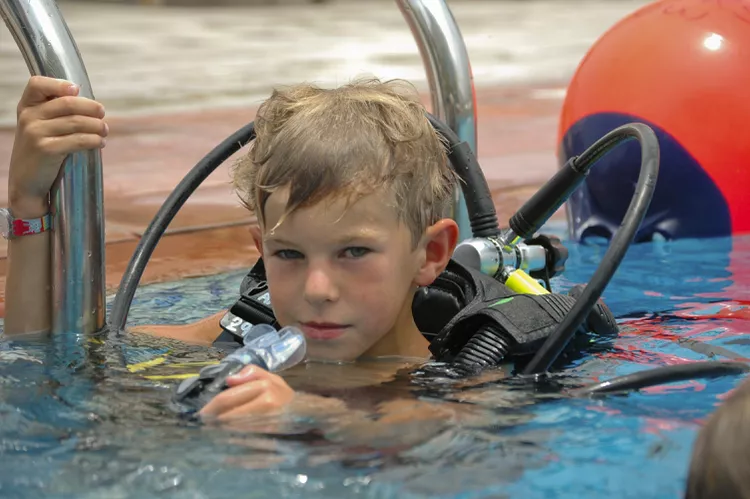Summary
What is the minimum age a child should be allowed to scuba dive? According to PADI (the Professional Association of Dive Instructors), kids can be certified as Junior Open Water Divers as early as the age of 10. However, whether this is recommended for all children is a subject of ongoing debate within the diving community. Children develop physically and mentally at different rates, thus making it challenging to define an age at which all children can safely dive. Factors like maturity, reasoning skills, and physical limitations should be taken into account when considering if a child is ready to begin scuba diving.
Warning: There Have Been No Experimental Studies on This Subject
Hyperbaric scientists cannot take young children diving to subject them to various dive profiles and risk factors just to see how many get decompression illness or dive-related injuries. Such experiments would be unethical. Much of the debate regarding children and diving is fueled by the lack of concrete experimental evidence proving the safety of scuba diving for children.
Not All Children and Teenagers Should Dive
While scuba diving certification agencies allow children to enroll in scuba classes, not all kids and teenagers may be ready for the stress of the underwater environment and the theoretical work required. In “Children and Scuba Diving: A Resource Guide for Instructors and Parents,” PADI recommends that if the following questions can be answered positively, a child may be ready to enroll in a scuba diving certification course.
Helpful Guidelines to Determine If a Child Is Ready for a Scuba Certification:
- Does the child genuinely want to learn to dive?
- Is the child medically fit to dive?
- Is the child comfortable in the water and capable of swimming? Passing a swimming test is crucial.
- Does the child have an adequate attention span to engage in class discussions and instructor briefings?
- Can the child learn and apply multiple safety rules and principles effectively?
- Are the child’s reading skills sufficient to comprehend adult-level materials?
- Is the child comfortable communicating discomfort or confusion about any aspect of diving?
- Does the child exercise reasonable self-control and seek help instead of reacting impulsively?
- Can the child grasp basic abstract concepts such as space and time?
Arguments in Favor of Children Diving
- The younger individuals begin scuba diving, the more comfortable they are likely to become.
- Parents who dive can introduce their children to scuba holidays, fostering a shared love for the underwater world.
- Diving courses integrate principles from physics, math, and natural science into real-world applications.
- Diving promotes conservation awareness for the natural environment.
- Although risks exist in diving, many life activities involve risk. Teaching responsible risk management can foster personal accountability in youth.
Medical Arguments Against Children Diving
- Patent Foramen Ovale (PFO): Infants have a passageway in their hearts that can lead to complications if it remains open. Initial research indicates that PFOs might increase the risk of decompression illness.
- Equalization Issues: Children may struggle to equalize pressure while descending underwater due to anatomical differences in their eustachian tubes.
- Unknown Physiological Effects of Diving: The effects of increased pressure on developing tissues and bones are not well understood, raising concerns about childhood diving.
- Children may perceive discomfort differently than adults, which can complicate communication regarding potential dangers.
Psychological Arguments Against Children Diving
- Concrete Thinking: Younger children may struggle to logically apply learned safety rules to unexpected scenarios. Training agencies typically require adult supervision for young divers.
- Discipline: Children must have the discipline to complete safety checks and adhere to safe diving practices post-certification.
- Responsibility for a Buddy: Child divers must possess the reasoning skills to assist an adult buddy in emergencies.
- Fear and Frustration: Unlike many sports, diving requires a logical and controlled response to underwater distress.
Ethical Arguments Against Children Diving
Diving poses inherent risks, placing divers in potentially life-threatening environments. Can a child fully grasp the risks involved in scuba diving? Many children may not appreciate their vulnerability until faced with a reality they cannot escape. Even if they express understanding of possible severe outcomes from diving accidents, their comprehension often remains limited, leading to ethical quandaries about exposing children to such risks.
Author’s Opinion
Diving might be suitable for some children, but the decision should involve careful consideration by parents, instructors, and the children themselves. It is essential to evaluate each case individually, weighing the arguments for and against child diving. While I have encountered young divers who demonstrate safety and control exceeding that of some adults, they are truly the exception rather than the norm.
Sources
- Edwards, Lin. “Scuba Diving for Children, Is it Dangerous?” May 3, 2008. Read More
- Gulliver. “Children: Should They Be Allowed to Dive?” November 10, 2009. Find Out More
- PADI. “Children and Scuba Diving: A Resource Guide for Instructors and Parents”. Page 17, PADI International 2002-2006, USA
- Taylor, Larry Harris. “Why I Do Not Train Kids”. April 28th, 2001. Explore Here




